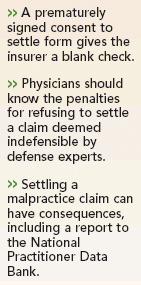Article
Should you sign a "consent to settle"?
Malpractice Alert
If your liability insurance policy has a clause that requires your consent to settle; consider yourself fortunate. Although some states require insurers to obtain a malpractice defendant's consent to settle, others don't, and in these states some insurers can decide to settle a claim that the doctor-defendant would rather fight in court.

For instance, some policies reduce coverage limits when consent to settle is withheld for reasons that the insurer considers arbitrary, and some may force you to share defense costs. So you need to familiarize yourself with the consent clause and understand what your rights are.
Signing a consent to settle document isn't a "formality." If you haven't yet decided to settle, and if the plaintiff hasn't even made a settlement demand, the signed form gives the insurer a blank check. Some carriers have settled cases without the knowledge of the defendants, who believed the cases would be fought in court or dismissed. But the insurers relied on consent forms signed when the cases were initiated years earlier when few of the facts were known.
An insurer may want the option to settle at its discretion, whether or not you're negligent. For example, it may agree to a "modest" settlement on your behalf to avoid legal expenses or the costs of litigation, without regard to any adverse effects such a settlement may have on you.
And the adverse effects can be significant. The settlement will be reported to the National Practitioner Data Bank, where the information will be accessible to hospitals as well as to any third-party payers you contract with. Your status with these organizations could be affected and so could your future insurability with your present insurer or a different one. Your malpractice premiums could increase.
But what if there are reasons other than your conduct to settle a lawsuit? Say there are poor medical records, unresolved conflicts between your testimony and the testimony of others, or personal or professional problems that could influence a jury if disclosed at trial. In such cases, withholding your consent may be considered unreasonable.
If you decline to sign the consent to settle form before the case has been evaluated, and your insurer threatens sanctions, consider retaining an experienced, independent medical law attorney to advise you.

The author is a risk management consultant in Cloverdale, CA. He can be reached by e-mail at lossprevention@earthlink.net
.
This department addresses common professional liability issues. It isn't intended to provide specific legal advice. If you have a question, please submit it to Malpractice Consult, Medical Economics, 123 Tice Blvd., Suite 300, Woodcliff Lake, NJ 07677-7664. You may also fax your question to 201-690-5420 or e-mail it to memalp@advanstar.com
.





